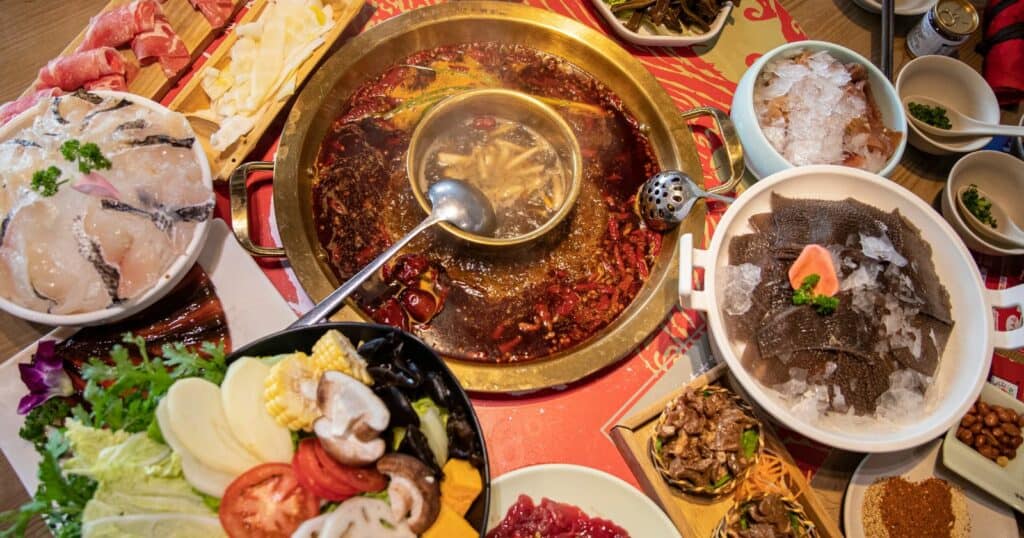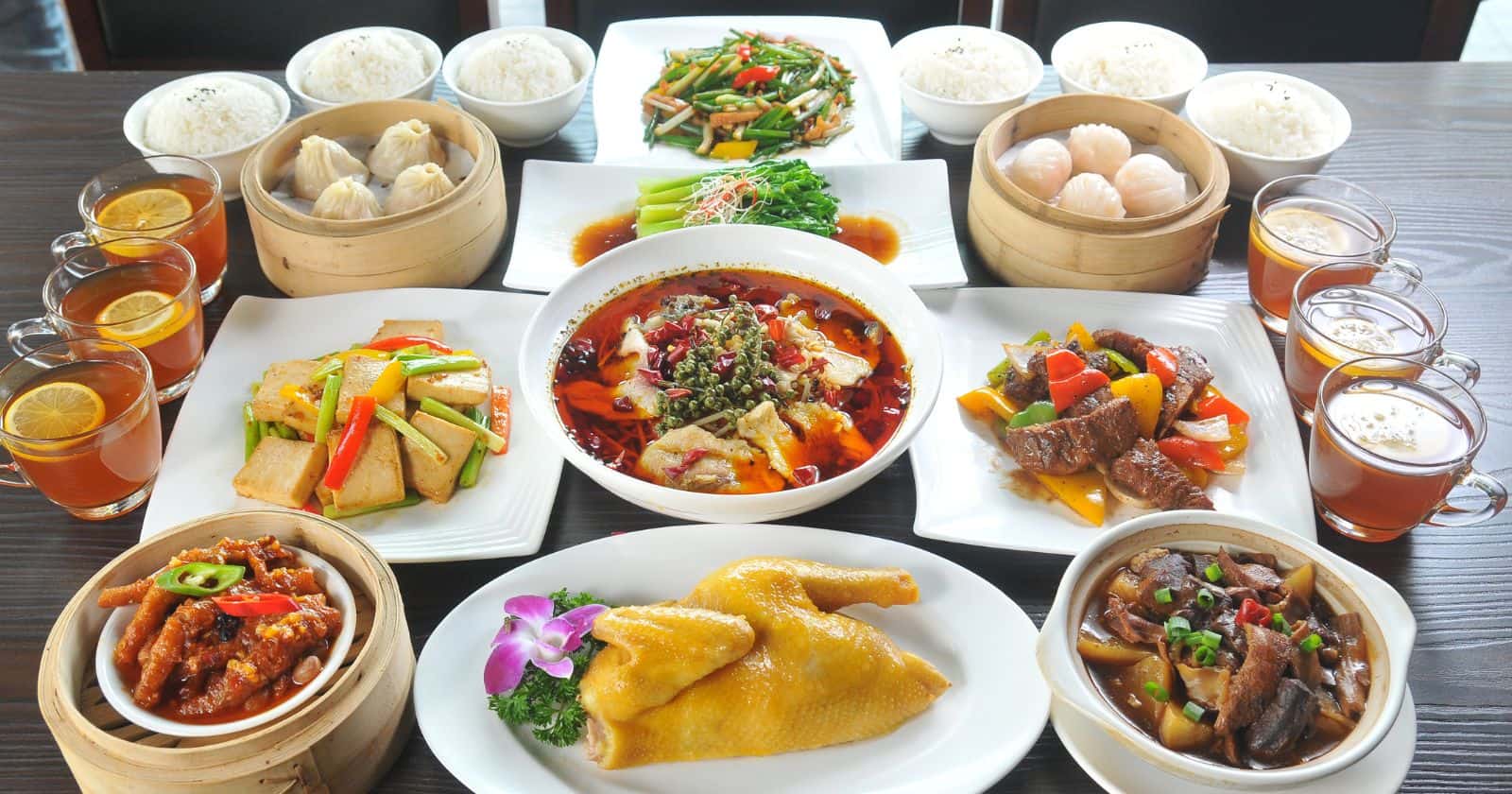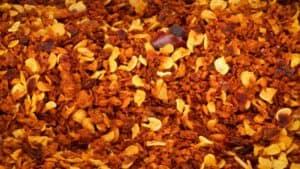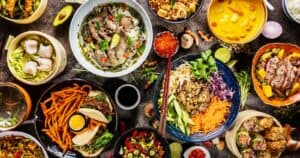Chinese takeout is delicious, but it often leads to digestive issues afterwards. If you’ve ever experienced an urgent trip to the bathroom after eating General Tso’s chicken, you know the struggle is real.
So why does Chinese food cause diarrhea or make you poop? There are a few main culprits:
- Oils and Fats: Chinese dishes like orange chicken and egg rolls are cooked with lots of oil or deep fried, which can delay digestion.
- MSG: The flavor enhancer monosodium glutamate found in Chinese food can provoke diarrhea for some people.
- Spices: Chili peppers and Sichuan peppercorns give Chinese food its signature
spice , but they also stimulate the gut. - Sugars: Sugar substitutes in sweet sauces may ferment in the intestines and cause gas or diarrhea.
The good news is with some care when ordering and eating, you can enjoy Chinese takeout without the unwanted side effects. In this article, we’ll explore why Chinese food can cause runs and how to prevent it.
Common Causes of Chinese Food Diarrhea
There are a few key culprits that can contribute to Chinese food causing diarrhea or other digestive issues:
High Fat Content
Chinese dishes like General Tso’s chicken, sweet and sour chicken, egg rolls, and fried rice are usually deep fried or cooked with large amounts of oil. The high fat content can delay stomach emptying and cause bloating, gas, nausea, and loose stools.
MSG
Monosodium glutamate (MSG) is a flavor enhancer commonly added to Chinese food. Some people may have sensitivity to MSG, which can cause headaches, flushing, and diarrhea.
Spicy Foods
Spicy Sichuan and Hunan-style dishes get their heat from chili peppers and Sichuan peppercorns. Capsaicin and other compounds in chilies can stimulate the gut and increase motility, leading to urgent bathroom trips.
Sugar Alcohols
Sugar substitutes like sorbitol and xylitol are used in some sauces. They can ferment in the gut, causing gas, bloating, and diarrhea when consumed in large amounts.
High Sodium
The salty flavor in soy sauce, oyster sauce, and other seasonings contains a large amount of sodium, which draws water into the intestines and causes diarrhea.
Rice and Noodles
The high starch content of white rice, noodles, and fried rice can be difficult for some people to digest properly. This can result in abdominal pain, bloating, and loose stools.
Other Factors That Can Worsen Digestion
Aside from the food itself, there are other factors that can contribute to indigestion and diarrhea after eating Chinese food:
- Overeating – Consuming large portions and excessive calories can overwhelm the digestive system.
- Eating Too Quickly – Wolfing down food doesn’t allow proper chewing and digestion.
- Dehydration – Not drinking enough fluids can make digestion sluggish and stools loose.
- Underlying Conditions – Food sensitivities, IBS, SIBO, or other conditions may be exacerbated by certain foods.
- Alcohol – Consuming alcohol with a greasy, spicy meal can further irritate the stomach.
Managing Food Intolerances

Some people may have sensitivities or intolerances to common ingredients in Chinese food like soy, wheat, MSG, or shellfish. An intolerance to one of these foods could manifest as abdominal pain, bloating, nausea, or diarrhea after eating Chinese cuisine.
If you suspect you may have a food intolerance, try eliminating suspect foods one by one to see if your symptoms improve. Here are some tips:
- If you have issues with dairy, avoid dishes like Mongolian beef made with cow’s milk. Opt for a vegetable or chicken dish instead.
- Request gluten-free substitutions if you are sensitive to wheat. Ask for rice noodles instead of wheat noodles in dishes.
- Let the staff know you have a soy allergy and ask them to avoid soy sauce, tofu, edamame, and other soy products when preparing your meal.
- Avoid shellfish like shrimp, lobster, or crab if you have a shellfish allergy or intolerance. Opt for chicken or beef instead.
- Request no MSG if you have a sensitivity. Ensure other seasonings like salt and soy sauce are also used sparingly.
- Stick to steamed or grilled dishes instead of anything fried in peanut oil if you have a peanut allergy.
Work with a dietitian or allergist if needed to pinpoint problem foods. They can also provide guidance on managing your food intolerances while still enjoying some Chinese cuisine. With the right modifications, you can get your Chinese fix without digestive distress!
Tips to Prevent Chinese Food Diarrhea
While Chinese takeout is hard to resist, there are some ways to enjoy it without wreaking havoc on your digestive system:
- Choose steamed or boiled dishes instead of fried options.
- Opt for brown rice or quinoa instead of white rice or fried rice.
- Ask for sauce and oil on the side so you control how much you use.
- Avoid heavy sauces like sweet & sour or foods cooked in chili oil.
- Request no MSG when ordering.
- Eat slowly, chew thoroughly, and stop when full.
- Balance the meal with non-starchy vegetables, fruits, or yogurt.
- Stay hydrated by drinking water with the meal.
- Take probiotic supplements to support healthy digestion.
- Limit alcohol consumption, especially beer which can be gassy.
Natural Laxatives in Chinese Ingredients
In addition to the high fat and
Garlic
Garlic contains allicin and other compounds that help relieve constipation by stimulating contractions in the intestines. It also has prebiotic effects that support healthy gut flora.
Ginger
Gingerols and shogaols in ginger have anti-inflammatory properties that soothe the gut. Ginger also enhances the motility of the digestive tract to ease constipation.
Green Tea
Caffeine and catechins in green tea promote contraction of the colon to stimulate bowel movements. It has a mild laxative effect.
Certain Vegetables
Fruits and veggies like bok choy, napa cabbage, bitter melon, daikon radish, and winter melon are natural sources of fiber, water, and nutrients that can relieve constipation.
Sichuan Peppercorns
Hydroxy-alpha-sanshool in Sichuan pepper produces a slight numbing effect on the intestines and promotes bowel movements. But eat them in moderation!
When to See a Doctor
Occasional digestive discomfort after eating Chinese food is normal, but prolonged issues could indicate a food intolerance or underlying condition:
- Diarrhea lasting more than 3 days
- Intense abdominal pain
- Blood in stool
- Fever or dehydration
- Unintentional weight loss
See your doctor if diarrhea frequently follows eating Chinese food or any other meals. They can check for infections, food allergies, IBS, celiac disease, and other issues. Keeping a food and symptom diary is helpful.
Proper diagnosis and treatment can help resolve chronic digestive problems and allow you to enjoy Chinese cuisine again!
The Takeaway on Chinese Food and Diarrhea
Spicy Szechuan dishes and greasy General Tso’s chicken are hard to pass up! But the fat, salt, MSG, spices, and veggies in Chinese food can be tough on the stomach.
Pacing yourself, choosing milder options, and listening to your body can allow you to savor Chinese cuisine without the unwanted runs. If problems persist, consult your doctor to identify any underlying causes.
With some care in preparation and eating, you can say “hello” to Chinese takeout again without saying “goodbye” to your bathroom for the rest of the night!





